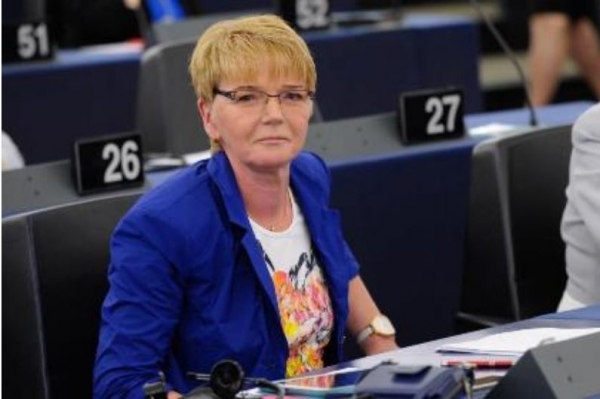For a long time, Europe has been immersed in a spiral of austerity with the countries of the South, that are suffering the most. Given that for the next four years the two largest countries in Europe are not expected to change their economic policy or even attitude towards the economic policy in the eurozone, a) could you predict how the economy will evolve in the eurozone in the following two or three years, and b) what are the basic changes that you consider crucial?
Actually, I do not want to play the role of the oracle of Delphi and predict economic developments which depend on many international factors. It´s economic experts who foresee results of different economic scenarios. What we can definitely see is that austerity which was enforced on Member States failed as it increased inequalities and poverty and blocked or heavily slowed down economic recovery. Countries where anti-cyclical macroeconomic policies were applied had a much faster recovery after the financial and banking crisis. We can also see that the EU is far from exiting the various crises, contrary to Commission President Juncker´s claim. The debt problem of many countries has not yet been solved, poverty and unemployment are still quite high, and right-wing extremist parties are on the rise in industrialised countries.
In my point of view, austerity has to end as soon as possible. It did not solve the problems nor address the needs of the people. Austerity is also an attack on our democracies as governments are prevented from applying the policies and programmes they have been elected for. Austerity is essentially the culmination of the neoliberal ideology with its focus on global competitiveness, privatization and liberalization of public wealth, property, and services, precarious working conditions and the destruction of culture.
We have to struggle against the whole framework. The EU needs to adapt debt relief measures in order to enable Member States to invest in sustainable development and inclusive growth. Everybody has to benefit from economic development, not only rich persons and big enterprises, in order to contribute to social cohesion and to fair societies. A legally binding EU social pillar will be crucial. Only minimum standards of wages and incomes and enforceable social and labour rights for EU citizens will decrease inequalities.
Are you expecting an alarming rise of the far right in the following years in the EU? Who do we have to blame for this rise?
This year´s elections in France, Germany and Austria showed a worrying tendency towards far right parties. I fear that this tendency will continue as long as the root causes of the problems are not addressed adequately. Many people in EU countries are afraid of growing inequalities and precarious working conditions, unemployment and world politics which seem to be more and more complex, less and less controllable. Many right-wing parties are quite successful in exploiting these inequalities and fears by promising easy solutions to complex problems and blaming people such as migrants and refugees.
I think that the neoliberal “Zeitgeist”, its apologists and their policies since the 1980s are responsible for increasing insecurities, fears and the rise of the right. Even most social democratic parties decided to accept the neoliberal framework. Such a weak state hands over power to rich people, big corporations and banks. EU leaders handed over workers, employees and the weakest to market forces and stopped defending workers´ and social rights.
Many people could no longer see distinct political concepts which are crucial for lively democracies. People feel that they are left alone with their problems and even start questioning democracy. The far right is able to channel these feelings. They present apparent “alternatives” to the neoliberal model of the EU: back to nations, migrants as a threat to national social systems and living conditions. The big task for the left is to develop a social model for Europe. Such an EU where citizens´ rights are strengthened and where solidarity between populations and Member States are the fundamental base for European integration.
In recent years we have experienced a permanent attack on the welfare state in most Εuropean countries. Does the EU aim to defend the welfare state and if yes, does it have the power and the means to do so? Are you optimistic or pessimistic about the evolution of our welfare state?
The dominant neoliberal elites in the EU are assessing every EU policy in terms of its contribution to a free internal market. If social policies are hindering free movement of capital, services and products, they are undermined. If they contribute, in their view, to this market they can even be strengthened. The problem is that policies are focussed not on EU citizens as human beings who need and wish for social protection, but on market needs. The EU still has not joined the revised European Social Charter as some Member States reject that.
Without changing the Treaties it will almost impossible to fundamentally strengthen the social character of the EU. The primacy of economic freedoms over social rights and workers’ protection has to be lifted. Firstly, we need, at least, a Social Protocol. All persons living in the EU have to have access to social insurances and to be entitled to a minimum income. This is crucial to guarantee equality and to stop the exclusion of ethnic groups or whole segments of the populations.
We need actual solidarity between people and Member States, not reckless competition. If the EU does not become the project of the people, it will fail. But, a failure would be very dangerous, in my opinion, because the resulting space could be filled by far-right and nationalist forces. There must never again be a Europe where the populations face each other with arms and weapons.
Published on CNN Greece 21-11-2017


